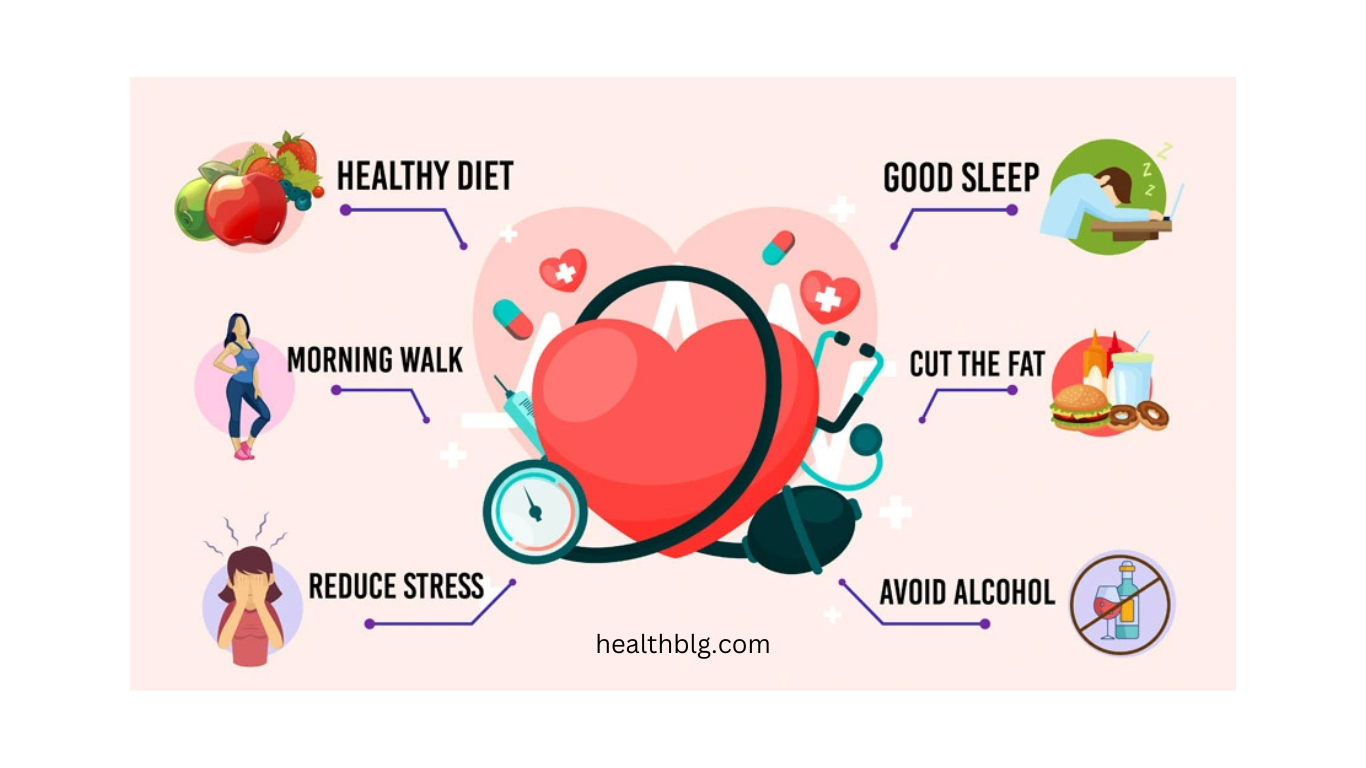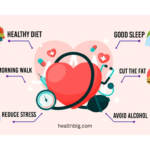The literal meaning of the heart is the organ in the human body that circulates blood and, thus, nutrients to the cells that support life. However, when driving a car, an engine may overheat when running at high speed, and a heart that beats too fast or too slow can cause specific health issues. Healthy heart hacks are essential as most people consciously try to enhance their general cardio fitness via training, nutrition, and lifestyle alterations; reducing your resting heart rate (RHR) is one of the most effective things you can do for your heart.
Resting heart rate (RHR) refers to the number of times your heart beats per minute, measured in bpm, when you wake from bed without moving. Adults’ RHR is between 60 and 100 bpm, but it may be lower depending on an athlete’s physical fitness level. RHR, which remains elevated most of the time, is associated with heart disease, high blood pressure, and many other related ailments.
This guide covers the hows and whys of this valuable process. It will reveal why bringing your resting heart rate down is useful and what it indicates about your health. Using information from several dozen scientific studies, it will offer tips on achieving this goal from the comfort of your home.
Healthy Heart Hacks – Table of Contents
- Understanding Resting Heart Rate (RHR)
- What is Resting Heart Rate?
- Normal vs. High RHR: What’s Considered Healthy?
- Why Resting Heart Rate Matters for Heart Health
- The Link Between RHR and Overall Cardiovascular Fitness
- Factors That Affect Resting Heart Rate
- Age and Gender
- Physical Fitness and Activity Level
- Diet and Hydration
- Emotional and Mental Health
- Medications and Medical Conditions
- How a High Resting Heart Rate Affects Your Health
- Increased Risk of Heart Disease
- Elevated Blood Pressure
- Stress and Anxiety
- Impaired Blood Flow and Oxygenation
- Science-Backed Heart Hacks to Lower Resting Heart Rate
- Hack 1: Regular Cardiovascular Exercise
- Hack 2: Practice Deep Breathing Techniques
- Hack 3: Improve Your Sleep Quality
- Hack 4: Reduce Stress Through Meditation and Mindfulness
- Hack 5: Stay Hydrated
- Hack 6: Adopt a Heart-Healthy Diet
- Hack 7: Cut Back on Caffeine and Stimulants
- Hack 8: Maintain a Healthy Weight
- Hack 9: Quit Smoking and Limit Alcohol Consumption
- Hack 10: Consider Yoga and Tai Chi for Relaxation
- Tracking Your Progress and Maintaining a Healthy RHR
- Using a Heart Rate Monitor or Smartwatch
- Keeping a Health Journal
- Consulting a Health Professional for Personalized Advice
- Conclusion: Long-Term Heart Health and Maintaining a Lower RHR
Chapter 1: Understanding Resting Heart Rate (RHR)
What is Resting Heart Rate?
Healthy heart hacks: the most commonly used cardiovascular parameter is the RHR- the number of heartbeats per minute (bpm) while an individual rests. Getting a reading first thing in the morning when you are not exerting yourself or moving around is common, and this is a measure to indicate the health of the cardiovascular system. The factors that can affect your RHR include:
- Your physical fitness.
- Genetic makeup.
- The state of your emotions.
- Your general body health.
A relatively low RHR is usually associated with a high level of cardiovascular fitness because the heart can pump more blood at a single moment. On the other hand, it may indicate stress, poor fitness, or the presence of some underlying diseases.
Normal vs. High RHR: What’s Considered Healthy?
healthy heart hacks: Most people’s regular pulse or resting rate is between 60 and 100 bpm. However, this range is sometimes fixed and can depend on age, fitness, and exercise intensity. Even though the resting heart rate values may vary, the most effective one, according to most patients, is within the range of 60 to 80 bmp for adults.
People with deficient fitness levels might have a high resting heart rate of about 60 to 100 bpm, while very fit persons might have a resting heart rate of about 40 to 60 bpm. This is because,e with every heartbeat, the heart has to pump blood to the body parts, which is achieved through regular cardiovascular exercise.
Tachycardia occurs when a man’s heart rate is above 100 bpm, even when resting. It is a sign of cardiovascular problems like hypertension, an increased chance of heart disease, or stress. Elevated RHR can superimpose extra load on the heart and other vital organs and raise the risk of having a heart attack or even stroke.
Why Resting Heart Rate Matters for Heart Health
Your RHR is essential to cardiovascular health because it demonstrates how efficiently your heart works. Palpitations during rest could indicate poor cardiovascular health or an underlying health condition. On the other hand, low RHR means that your heart is healthy and functioning, requiring less time to pump blood around your body.
Lowering your RHR can benefit your heart in several ways:
- Reduced risk of heart disease: It has also been found that a lower RHR is a sign of less danger of heart disease, stroke, and other cardiovascular diseases.
- Improved oxygen delivery: The conditioned heart pumps blood efficiently in the body, providing all it needs in terms of oxygen to boost energy and stamina.
- Better overall health: Proper training, enough sleep, and stress reduction are the only ways to lower your RHR.
The Link Between RHR and Overall Cardiovascular Fitness
The ability to measure a man’s cardiovascular fitness is directly proportional to his resting heart rate. Any exercise, especially running, cycling, or swimming, is related to lower resting heart rates because the heart and lungs become efficient.
The impact of cardiovascular exercise is that the heart is trained to pump blood even more efficiently. It results in a decline in the bpm at which the heart has to pump blood to maintain circulation at the organ level for resting condition. Indeed, reducing RHR is generally the first sign that an exercise program is doing you good and enhancing your cardiovascular fitness.
Chapter 2: Factors That Affect Resting Heart Rate
Below are some conditions that enable you to prescribe the right resting heart rate: lifestyle, genetic predisposition, age, and diseases.
Age and Gender
It was established that as people age, their heart rate at rest tends to rise. This is partly because of reduced efficiency of contractibility of the heart muscle and increased wear and tear of the cardiovascular system. As a rule, women have higher resting heart rates than men but do not exceed a specific figure by much.
Physical Fitness and Activity Level
Physical activity means a person has a lower resting heart rate than sedentary individuals. Carpentry work, cycling, walking, running, swimming, and other aerobic exercises are suitable for the heart since they assist the muscle in working harder, thus causing it to pump blood with maximum capacity with the least effort. On the other hand, inactivity or problems with inactivity may lead to a higher resting heart rate.
Diet and Hydration
The amount and type of food consumed also affect the resting heart rate and the amount of fluid consumed. Inaccurate reading of a thermometer, drinking tea, smoking, or eating foods that contain sodium, caffeine, or unhealthy fats. On the other hand, adequate water intake and a diet high in fruits, vegetables, lean protein, and foods associated with reduced risks of cardiac events are associated with a lower RHR.
Emotional and Mental Health
Stress, anxiety, and even depression can raise your resting heart rate. When the body is stressed, the sympathetic nervous system is stimulated, releasing hormones such as adrenaline and cortisol, which enhance heart rate. Stress adversely affects RHR, so helpful relaxation methods like meditation, mindfulness, and proper relaxation processes like deep breathing will help reduce it.
Medications and Medical Conditions
Some drugs like stimulants (Caffeine, some common cold remedies, and ADHD medications) cause high RHR. Also, other diseases such as thyroid problems, heart troubles, or apnoea may result in an irregular basal heart rate. Always consult a healthcare provider if you feel that medications and health conditions already impact the heart rate.
Chapter 3: How a High Resting Heart Rate Affects Your Health
Regular high resting rates can cause several effects on the health of an individual’s cardiovascular system and well-being.
Increased Risk of Heart Disease
A high resting heart rate is usually a risk factor for heart disease and other cardiovascular diseases. Research has also demonstrated that people with a resting pulse rate higher than 80 beats per minute are likely to develop a heart attack or stroke, even though they have diabetes, hypertension, or elevated cholesterol.
Elevated Blood Pressure
Studies have shown that an increased resting heart rate tends to cause high blood pressure (hypertension). The pumping rate increases the pressure exerted on the artery walls, putting more stress on the cardiovascular system. This strains the blood vessels in the long run and increases the chances of heart disease and stroke.
Stress and Anxiety
It also shows high risks of stress hormonal ties levels are usually associated with a high RHR. Whenever the heart races, this activates the body’s stress response or ‘fight or flight’ mechanism, which makes you feel more anxious, nervous, or irritable. Hypertension, in turn, will cause high RHR, and the causative stress will increase, leading to more anxiety, implying a high RHR and vice versa.
Impaired Blood Flow and Oxygenation
When the heart contracts too often, it doesn’t have enough time to fill with blood to its optimal capacity between contractions. This may make circulation to organs the poorest and reduce the oxygenation supply, leading to fatigue, dizziness, or shortness of breath.
Chapter 4: Science-Backed Heart Hacks to Lower Resting Heart Rate
Hack 1: Regular Cardiovascular Exercise
This is one of the most helpful procedures for reducing the resting heart rate through daily essential aerobic exercise. Endurance exercises like jogging, swimming, cycling, or fast walking incline the heart muscles and improve blood circulation. Consequently, over time, this results in a decline in RHR or resting heart rate.
Physical activity should be moderate intensity for at least 150 minutes or vigorous intensity for 75 minutes per week. Tasks such as walking or cycling are good ways to incorporate more physical activity into one’s life.
Hack 2: Practice Deep Breathing Techniques
It can help decrease the resting rate due to the parasympathetic stress-reducing response, which works against the stress response or ‘fight or flight.’ Take deep breaths in and out of your mouth and through your nose in a straight line depicting diaphragmatic, box, or 4-7-8 breathing.
To practice deep breathing:
- Unwind yourself by either sitting or lying down.
- Try to breathe in for four counts using your diaphragm and breathing through your nose.
- Take a breath and hold it; count to seven.
- Breathe out through your mouth until you count to eight.
- Continue this process for several minutes until you’ve calmed the nervous system and decreased your heart rate.
Hack 3: Improve Your Sleep Quality
Sleep plays a vital role in the functioning of the human heart. Lack of sleep is associated with high heart rate, high blood pressure, and stress. Try to have a proper 7 to 9 hours daily by going to bed and waking up at the correct time, having an adequate bedtime regimen, and eliminating noise, light, and other disturbances in the bedroom.
Hack 4: Reduce Stress Through Meditation and Mindfulness
Another major cause of a high resting rate is stress, which, when prolonged, is damaging to one’s health. Meditation and mindfulness reduce stress, lower your heart rate, and improve your emotionally healthy heart hacks. Mindfulness means focusing on the current moment without passing judgment, but meditation is the mind’s settlement and the body’s calming.
Hack 5: Stay Hydrated
My rate may be higher due to inadequate blood volume, as the body tries to dilute the little blood in circulation through the heart. Drinking water in large quantities prevents heart failure and enables your body to flow optimally. The recommended daily water intake should be at least 2 liters or eight cups if you are physically active.
Hack 6: Adopt a Heart-Healthy Diet
Research shows that increased intake of fruits, vegetables, lean protein, and whole grain products also lowers the rest rate and improves cardiovascular health. Reduce your intake of foods that undergo a lot of processing, foods with added sugar, foods high in sodium, or unhealthy fats. Omega-3 fatty acids, such as those found in fatty fish like salmon and in products like walnuts, are suitable for the heart.
Hack 7: Cut Back on Caffeine and Stimulants
Consuming too much caffeine raises heartbeat rates and causes anxiety. To reduce your resting heart rate, avoid products containing caffeine, such as coffee, tea, or energy drinks. Instead, choose herbal teas associated with relaxation.
Hack 8: Maintain a Healthy Weight
Obesity increases pressure on the heart, resulting in an elevated resting heart rate. As mentioned earlier, exercising and eating healthy will decrease the extra workload on the heart, lowering your RHR.
Hack 9: Quit Smoking and Limit Alcohol Consumption
Smoking can trigger an increased heart rate and is associated with a higher risk of the disease if one takes too much alcohol. Smoking Cessation and Alcohol consumption can be reduced to reduce your resting heart rate and consequently enhance your health.
Hack 10: Consider Yoga and Tai Chi for Relaxation
Yoga and tai chi are gentle exercises involving body movement and specific breathing patterns to decrease unwanted stress and heart rate. They are known to lower stress, increase flexibility, and improve the cardiovascular system.
Chapter 5: Tracking Your Progress and Maintaining a Healthy RHR
You should integrate a heart rate monitor or a smartwatch that measures your heart rate all day to monitor your resting heart rate continuously. Many fitness trackers nowadays have integrated heart rate monitors that tell you variability over time.
Second, by following a health journal, you can track your heart rate, exercise regimen, and diet plan and analyze them for improvements. For anyone with little or no idea how to reduce their RHR, seeking professional advice from a physician or fitness instructor is always advisable.
Chapter 6: Conclusion
Reducing resting heart rate remains one of the easiest ways to enhance the health of their hearts and bodies and healthy heart hacks. You can control your heart rate by embracing various lifestyle changes, including exercise, stress, sleep, and diet.
What one does today to help reduce one’s resting heart rate will also help increase one’s quality of life as one grows older. Of course, this is important to remember because even minor adjustments result in drastic shifts to the health of one’s heart and its efficiency, so make a start now to change your life.










